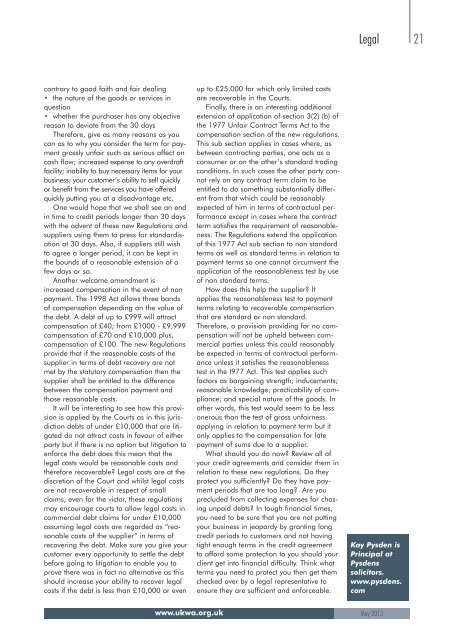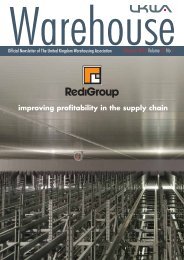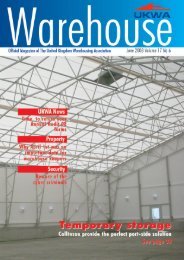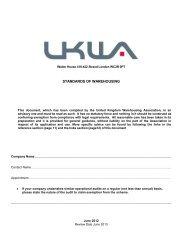Warehouse - United Kingdom Warehousing Association
Warehouse - United Kingdom Warehousing Association
Warehouse - United Kingdom Warehousing Association
You also want an ePaper? Increase the reach of your titles
YUMPU automatically turns print PDFs into web optimized ePapers that Google loves.
Legal 21contrary to good faith and fair dealing• the nature of the goods or services inquestion• whether the purchaser has any objectivereason to deviate from the 30 daysTherefore, give as many reasons as youcan as to why you consider the term for paymentgrossly unfair such as serious affect oncash flow; increased expense to any overdraftfacility; inability to buy necessary items for yourbusiness; your customer’s ability to sell quicklyor benefit from the services you have offeredquickly putting you at a disadvantage etc.One would hope that we shall see an endin time to credit periods longer than 30 dayswith the advent of these new Regulations andsuppliers using them to press for standardisationat 30 days. Also, if suppliers still wishto agree a longer period, it can be kept inthe bounds of a reasonable extension of afew days or so.Another welcome amendment isincreased compensation in the event of nonpayment. The 1998 Act allows three bandsof compensation depending on the value ofthe debt. A debt of up to £999 will attractcompensation of £40; from £1000 - £9,999compensation of £70 and £10,000 plus,compensation of £100. The new Regulationsprovide that if the reasonable costs of thesupplier in terms of debt recovery are notmet by the statutory compensation then thesupplier shall be entitled to the differencebetween the compensation payment andthose reasonable costs.It will be interesting to see how this provisionis applied by the Courts as in this jurisdictiondebts of under £10,000 that are litigateddo not attract costs in favour of eitherparty but if there is no option but litigation toenforce the debt does this mean that thelegal costs would be reasonable costs andtherefore recoverable? Legal costs are at thediscretion of the Court and whilst legal costsare not recoverable in respect of smallclaims, even for the victor, these regulationsmay encourage courts to allow legal costs incommercial debt claims for under £10,000assuming legal costs are regarded as “reasonablecosts of the supplier” in terms ofrecovering the debt. Make sure you give yourcustomer every opportunity to settle the debtbefore going to litigation to enable you toprove there was in fact no alternative as thisshould increase your ability to recover legalcosts if the debt is less than £10,000 or evenup to £25,000 for which only limited costsare recoverable in the Courts.Finally, there is an interesting additionalextension of application of section 3(2) (b) ofthe 1977 Unfair Contract Terms Act to thecompensation section of the new regulations.This sub section applies in cases where, asbetween contracting parties, one acts as aconsumer or on the other’s standard tradingconditions. In such cases the other party cannotrely on any contract term claim to beentitled to do something substantially differentfrom that which could be reasonablyexpected of him in terms of contractual performanceexcept in cases where the contractterm satisfies the requirement of reasonableness.The Regulations extend the applicationof this 1977 Act sub section to non standardterms as well as standard terms in relation topayment terms so one cannot circumvent theapplication of the reasonableness test by useof non standard terms.How does this help the supplier? Itapplies the reasonableness test to paymentterms relating to recoverable compensationthat are standard or non standard.Therefore, a provision providing for no compensationwill not be upheld between commercialparties unless this could reasonablybe expected in terms of contractual performanceunless it satisfies the reasonablenesstest in the I977 Act. This test applies suchfactors as bargaining strength; inducements;reasonable knowledge; practicability of compliance;and special nature of the goods. Inother words, this test would seem to be lessonerous than the test of gross unfairnessapplying in relation to payment term but itonly applies to the compensation for latepayment of sums due to a supplier.What should you do now? Review all ofyour credit agreements and consider them inrelation to these new regulations. Do theyprotect you sufficiently? Do they have paymentperiods that are too long? Are youprecluded from collecting expenses for chasingunpaid debts? In tough financial times,you need to be sure that you are not puttingyour business in jeopardy by granting longcredit periods to customers and not havingtight enough terms in the credit agreementto afford some protection to you should yourclient get into financial difficulty. Think whatterms you need to protect you then get themchecked over by a legal representative toensure they are sufficient and enforceable.Kay Pysden isPrincipal atPysdenssolicitors.www.pysdens.comwww.ukwa.org.uk May 2013
















